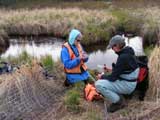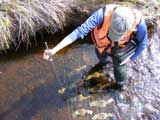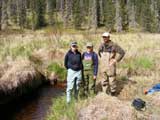Baylor Student Researchers Study Impacts on Wildlife in Alaska
by Nincy Mathew, student newswriter, (254) 710-6805
Follow us on Twitter: @BaylorUMediaCom
 With construction and new growth in virtually all regions of the United States, getting a better understanding of the role plants play in the survival of local wildlife is vital. Toward this goal, two Baylor University student researchers are spending their summer in the lower Kenai Peninsula in Alaska to research the effects of alder and its nitrogen contributions to small, salmon-rearing streams.
With construction and new growth in virtually all regions of the United States, getting a better understanding of the role plants play in the survival of local wildlife is vital. Toward this goal, two Baylor University student researchers are spending their summer in the lower Kenai Peninsula in Alaska to research the effects of alder and its nitrogen contributions to small, salmon-rearing streams.
"People rely on salmon for food and jobs," said Dr. Ryan King, associate professor of biology at Baylor who is the faculty advisor for the research. "Salmon is a multi-billion dollar industry in Alaska and what people are doing on their land affect the salmon they depend on."
Katie Zychowski, a Baylor senior from Houston, and Rebecca Shaftel, a Baylor graduate student from Alaska, joined King to take a closer look at the contribution nitrogen plays in this area. Nitrogen is important because it fuels microorganisms that support juvenile salmon growth and survival in streams.
A salmon's life cycle takes it from freshwater streams to the ocean, where they are live up to three years until maturity. Once they are adults, the salmon travel back to the streams to spawn. The following spring, tiny salmon hatch from the fertilized eggs left behind by their parents, continuing the cycle.
The nitrogen is provided by nitrogen fixing plants, plants that can convert atmospheric nitrogen into a form that organism can use. In this area of Alaska, the job is done by alder.  According to King, alder is a plant often found in open areas of this peninsula, but is thought of as a nuisance by local residents and often cleared. Nitrogen from alder "feeds" the organism in the stream and therefore contributes to the growth and survivorship of salmon, making it valuable to the ecosystem.
According to King, alder is a plant often found in open areas of this peninsula, but is thought of as a nuisance by local residents and often cleared. Nitrogen from alder "feeds" the organism in the stream and therefore contributes to the growth and survivorship of salmon, making it valuable to the ecosystem.
The study began in May and is an extension of a series of ongoing studies that began in 2005. King and his students collaborated with Kachemak Bay Research Reserve (KBRR) and the Smithsonian Institution. The study was funded by grants from the U.S Environment Protection Agency.
This kind of research is "geared toward training undergraduate and graduate students," King said. "Students are engaged in real research projects with more advanced scientists. The students can tap into their knowledge and experience and learn first hand."
But the Baylor students are also taking on their own research. Zychowski is also studying the effects of phosphorus and nitrogen on the decomposition and invertebrate production in the streams.
With Mount Redoubt erupting nearby, the peninsula has seen large amounts of phosphorus-rich volcanic ash. Zychowski said Alaskans assume the phosphorus have positive effects on the growth of salmon and organisms in the stream, replacing the need for nitrogen. She said she expects to find that phosphorus does not contribute to the stream in the same way that nitrogen does.
 "Alaska is a beautiful place. It's still very natural and wild," Zychowski said. "I woke up one morning and there was a moose and calf outside my window. We don't see that in Texas."
"Alaska is a beautiful place. It's still very natural and wild," Zychowski said. "I woke up one morning and there was a moose and calf outside my window. We don't see that in Texas."
Zychowski enrolled in aquatic biology last semester and was offered a job in King's lab soon after, processing the data from last year's trip to Alaska. After looking for a summer internship, she heard about the summer research fellowship opportunity in Alaska and decided to do it.
"It came between spending a summer in Alaska or Lubbock," Zychowski said.
After the fellowship, Zychowski is hoping to find a career in an environmentally based field. Zychowski said that many Biology majors don't recognize the options out there other than medical school. She hopes more students will notice that Baylor Biology professors are more ecologically based and have more of a life science background.
"A lot of students don't notice because they get immersed in the pre-med culture," Zychowski said. "This experience has been life changing."
For more information about the research, visit https://www.baylor.edu/aquaticlab or contact Dr. King at Ryan_S_King@baylor.edu or at (254)710-2150.